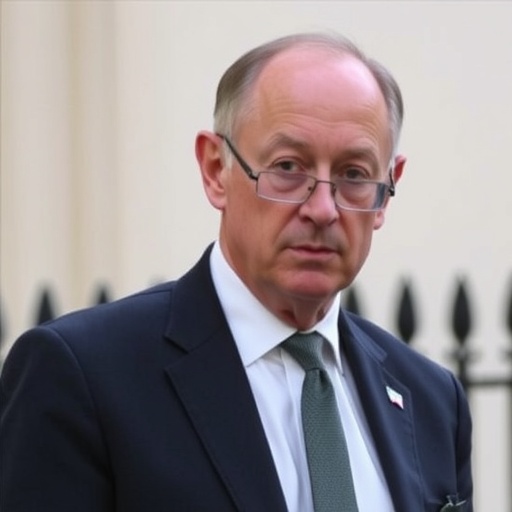UK Defense Secretary John Healey Pledges Support for Trump-Brokered Ukraine Peace Deal Amid Rising Peacekeeping Costs
In a bold statement that could reshape the trajectory of the ongoing Ukraine conflict, British Defense Secretary John Healey has affirmed the UK’s readiness to deploy peacekeeping forces if U.S. President-elect Donald Trump successfully brokers a peace agreement. This commitment, revealed during a high-level briefing in London, underscores the UK’s unwavering support for Ukraine while highlighting the formidable financial and strategic challenges ahead. With the specter of prolonged warfare looming, Healey’s pledge signals a potential pivot toward multilateral efforts to secure lasting stability in Eastern Europe.
The announcement comes at a critical juncture, as Trump has repeatedly vowed to end the Russia-Ukraine war within his first 100 days in office, promising a swift diplomatic breakthrough. Healey emphasized that any such deal must prioritize Ukrainian sovereignty, with the people of Ukraine holding the ultimate authority over negotiation terms. However, the deployment of UK troops for peacekeeping duties is projected to cost over £100 million, raising questions about fiscal sustainability and international burden-sharing.
This development not only bolsters hopes for de-escalation but also spotlights the intricate web of alliances in NATO, where the UK has been a steadfast backer of Ukraine since Russia’s full-scale invasion in February 2022. As global leaders await Trump’s inaugural address in January 2025, Healey’s words serve as a clarion call for unity in pursuing peace, even as the human and economic toll of the conflict continues to mount.
Healey’s Firm Stance: UK Backs Trump Initiative with Caveats
British Defense Secretary John Healey delivered his remarks during a press conference at the Ministry of Defence in Whitehall, where he outlined the UK’s conditional support for any peace process led by Trump. “The United Kingdom stands ready to contribute to securing peace in Ukraine if a viable deal is brokered,” Healey stated, his tone resolute yet measured. He stressed that the UK’s involvement would hinge on the agreement’s alignment with international law and Ukrainian interests, ensuring that Kyiv’s voice remains paramount.
Healey’s comments reflect a broader shift in Western strategy, as fatigue from the protracted conflict sets in. Since the war’s onset, the UK has provided over £12 billion in military and humanitarian aid to Ukraine, including advanced weaponry like Storm Shadow missiles and Challenger 2 tanks. This latest pledge extends that commitment into the peacekeeping realm, potentially involving up to 5,000 British troops in a multinational force. Experts note that such a deployment would mark the UK’s most significant European security operation since the Balkans in the 1990s.
Trump’s prospective role adds an unpredictable element. The incoming U.S. president has criticized the Biden administration’s approach, labeling it as enabling a “forever war.” In interviews, Trump has hinted at leveraging economic sanctions and direct talks with Russian President Vladimir Putin to force concessions. Healey acknowledged this dynamism, saying, “We welcome innovative diplomacy from our American allies, but it must be rooted in principles that protect Ukraine’s right to self-determination.” This balanced rhetoric aims to bridge transatlantic differences while reinforcing the UK’s leadership within NATO.
Behind the scenes, diplomatic channels are buzzing. Sources close to the Foreign Office indicate that Healey has already engaged in preliminary discussions with Ukrainian President Volodymyr Zelenskyy and NATO Secretary General Mark Rutte. These talks focus on contingency planning, including training Ukrainian forces for post-peace stability and monitoring ceasefire lines. The UK’s commitment is not without risks; Healey warned of potential escalations if Russian forces test the peace, underscoring the need for robust deterrence.
Peacekeeping Deployment: Breaking Down the £100 Million Price Tag
The financial implications of UK’s potential peacekeeping mission in Ukraine are staggering, with initial estimates pegging costs at more than £100 million for the first year alone. This figure, disclosed in a Ministry of Defence assessment, covers logistics, troop welfare, equipment maintenance, and infrastructure setup in a war-torn region. Defense analysts break it down further: transportation of personnel and materiel could account for 40% of the budget, while ongoing operational support—such as fuel, medical supplies, and communication systems—might consume another 30%.
To put this in perspective, the UK’s annual defense budget stands at around £50 billion, making the peacekeeping outlay a notable but manageable slice. However, it comes amid domestic pressures, including calls to bolster Britain’s own armed forces following years of austerity. “Deploying to Ukraine would strain resources already stretched thin by commitments in the Middle East and Indo-Pacific,” said Dr. Emma Salisbury, a senior fellow at the Royal United Services Institute (RUSI). She highlighted that similar missions, like the UN peacekeeping in Cyprus, have historically overrun budgets by 20-30% due to unforeseen challenges like mine clearance and refugee support.
The £100 million estimate assumes a rotational deployment of 2,000-3,000 troops, integrated into a larger NATO-led force. This could include engineering units to rebuild critical infrastructure, such as bridges over the Dnieper River, and medical teams to address the humanitarian crisis affecting over 10 million displaced Ukrainians. Healey justified the expense by invoking the long-term savings of peace: “Investing in stability today prevents the astronomical costs of tomorrow’s conflicts.”
Comparative data from past operations illustrates the scale. The UK’s involvement in Afghanistan from 2001-2021 cost £37 billion, while the more recent Operation Shader against ISIS in Iraq and Syria has exceeded £2 billion since 2014. For Ukraine, the peacekeeping role would emphasize non-combat duties, but risks remain high—over 500 Ukrainian civilians have been killed in 2024 alone, per UN reports. To mitigate costs, the UK is advocating for cost-sharing among allies, with the U.S. potentially footing a larger share under Trump’s deal-making ethos.
Public reaction in the UK is mixed. Polls from YouGov show 55% of Britons support aiding Ukraine, but only 38% favor troop deployments. Healey’s team is countering this with campaigns emphasizing the threat of Russian expansionism, drawing parallels to the 2014 annexation of Crimea.
Ukrainian Agency: Zelenskyy’s Role in Shaping Peace Terms
At the heart of Healey’s pledge is a resounding affirmation of Ukrainian agency. “The terms of any negotiation must be decided by the Ukrainians themselves,” Healey declared, echoing sentiments from Kyiv. This principle is non-negotiable, as Ukraine has endured over 900 days of invasion, with more than 40,000 civilian structures damaged or destroyed, according to the World Bank.
President Zelenskyy has been vocal about his red lines: full territorial integrity, including Crimea and Donbas, robust security guarantees, and reparations from Russia estimated at $1 trillion. In a recent address to the UK Parliament, Zelenskyy praised Healey’s support but cautioned against premature ceasefires that could legitimize occupation. “Peace without justice is surrender,” he warned, a stance that aligns with the UK’s position.
International law experts, such as those from the International Commission of Jurists, emphasize that any Trump-brokered deal must comply with the UN Charter. This includes prohibiting forced territorial concessions, a point Healey reiterated in his briefing. Ukraine’s negotiation team, led by Foreign Minister Dmytro Kuleba, has prepared detailed proposals, including a demilitarized zone along the border monitored by international observers.
The emphasis on Ukrainian decision-making also addresses concerns from Eastern European allies like Poland and the Baltics, who fear a U.S.-Russia bilateral deal sidelining NATO. Healey’s commitment reassures these partners, positioning the UK as a mediator. In bilateral talks, the UK has pledged £200 million more in aid for 2025, focusing on air defense systems to protect against Russian missile strikes that have intensified in recent months.
Civil society in Ukraine plays a pivotal role too. Grassroots organizations, such as the Ukraine Crisis Media Center, are mobilizing public input on peace terms, ensuring that women’s rights, environmental restoration, and economic recovery are not overlooked. Healey met virtually with these groups, promising UK technical assistance in post-war reconstruction.
NATO Dynamics: How Trump’s Deal Could Reshape Alliances
John Healey’s announcement injects fresh momentum into NATO’s Ukraine strategy, potentially altering the alliance’s dynamics under a Trump presidency. The UK, as one of NATO’s top spenders on defense (2.3% of GDP in 2024), views the peacekeeping pledge as a way to influence outcomes. “We cannot afford division at this moment,” Healey told reporters, alluding to Trump’s past criticisms of NATO’s burden-sharing.
Trump has floated ideas like reducing U.S. commitments unless allies increase spending, a stance that could pressure the UK to lead on Ukraine. Yet, Healey’s proactive offer might appeal to Trump’s deal-oriented style, fostering closer UK-U.S. ties. Analysts at the Atlantic Council predict that a successful peace deal could revitalize NATO, with Ukraine’s eventual membership serving as a cornerstone.
Broader context reveals escalating tensions. Russia’s military budget has surged to $100 billion annually, dwarfing Ukraine’s pre-war defense spending. NATO’s response includes the Steadfast Defender exercises in 2024, involving 90,000 troops—the largest since the Cold War. The UK’s peacekeeping role could integrate with these efforts, providing a bridge to long-term deterrence.
European leaders, from French President Emmanuel Macron to German Chancellor Olaf Scholz, have expressed cautious support. Macron’s recent proposal for European troop deployments aligns with Healey’s vision, though logistical hurdles persist. In a joint statement, the UK and France committed to coordinating with Trump, aiming for a “united front” against aggression.
Geopolitical ripple effects extend to the Global South. Countries like India and Brazil, wary of Western involvement, may view the UK pledge as a stabilizing force. Healey referenced UN Security Council discussions, where the UK pushes for resolutions endorsing multilateral peacekeeping.
Pathways to Peace: Scenarios and Challenges Ahead
Looking forward, the UK’s commitment opens several pathways for Ukraine’s future, each fraught with challenges. In an optimistic scenario, Trump’s negotiations yield a ceasefire by mid-2025, with UK peacekeepers arriving by summer to oversee withdrawals and elections in contested areas. This could pave the way for Ukraine’s EU accession talks, accelerated by UK advocacy.
However, pessimistic outlooks warn of stalemates. If Putin rejects terms, escalation risks rise, potentially drawing in more NATO resources. Healey outlined contingency plans, including hybrid threats like cyberattacks on UK infrastructure. The Ministry of Defence is investing £5 billion in cyber defenses, partly in anticipation of such spillover.
Economic recovery looms large. The World Economic Forum estimates Ukraine’s reconstruction needs at $500 billion, with the UK pledging £3 billion over five years. Peacekeeping could facilitate donor conferences, similar to those for Syria, ensuring funds reach frontline communities.
Public diplomacy will be key. Healey plans town halls to build support, while engaging youth through programs like the UK-Ukraine Tech Bridge, fostering innovation in a post-war era. As Trump assumes office, the world watches: will this be the deal that ends Europe’s largest conflict since 1945, or a prelude to renewed strife? The UK’s readiness positions it at the vanguard, ready to secure peace if the stars align.
In the coming weeks, expect intensified shuttle diplomacy. Healey’s upcoming visits to Washington and Kyiv will refine details, while parliamentary debates in Westminster scrutinize the costs. For Ukraine, the message is clear: the UK stands with you, not just in war, but in building an enduring peace.








